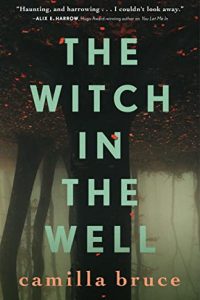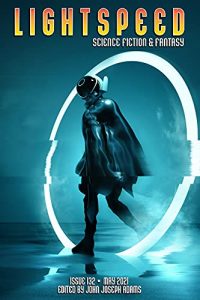Ian Mond Reviews The Peculiarities by David Liss
 The Peculiarities, David Liss (Tachyon 978-1-61696-358-0, $17.95, 336pp, tp) September 2021.
The Peculiarities, David Liss (Tachyon 978-1-61696-358-0, $17.95, 336pp, tp) September 2021.
David Liss is mainly known for his historical crime novels featuring 18th-century private investigator (or “thief-taker”) Benjamin Weaver. Lately, he’s turned his attention to genre fiction, with a trilogy of middle-grade space adventures (Randoms / Rebels / Renegades) and comics ranging from Black Panther to The Shadow. His 13th and latest novel, The Peculiarities, blends both the historical and the fantastic, taking place in an alternative 19th-century London where magic is real and where people have the tendency to transform into wolves, lizards, and trees.
Thomas Thresher, the son of Samuel Thresher, owner of Thresher Bank, has spent much of his twenties drinking and whoring his way across Cambridge and London. But when Samuel dies, Thomas, as per his father’s will, is forced to work as a junior clerk at the family bank. It’s a humbling experience for Thomas now that he is under the thumb of his cruel older brother Walter, the new Governor of Thresher Bank. There’s something else that pains Thomas. Over the last few months, his body has started sprouting leaves. While he can hide the condition – the leaf and stems easily snap off, leaving blemishes “the size of pinpricks – whiter and slightly firmer than the surrounding skin” – the foliage is appearing more frequently on his torso. His ailment is connected to the strange, unexplained anomalies and transformations occurring predominantly in the poorer parts of London. This includes the emergence of creatures dubbed the “Elegants” who glide through London’s mists dismembering prostitutes and the homeless. Thomas’s transformation, however, is only one of the issues he’s dealing with. For reasons unknown, his brother, who, it transpires, is also afflicted with the arboreal curse, is forcing Thomas to either marry a Jewess, Esther Feldstein, or face penury. Thomas has also heard rumours that Walter has made a series of reckless financial decisions – “whispers of large and inexplicable loans, of incoherent gambles” – that seem destined to bring Thresher Bank to its knees. In investigating his leafy condition and the machinations at the Bank, Thomas, along with Esther, becomes a member of the Hermetic Order of the Golden Dawn, encounters the horny scoundrel Aleister Crowley, and uncovers an occult conspiracy that will bring London to its knees.
Liss does a skilful job immersing the reader in the grime, grit, and class stratification of 19th Century London. The novel shines, however, when we enter the world of the occult. Not so much the fantastical elements – though the Elegants are creepy – but rather his depiction of the Order of the Golden Dawn and one of its more infamous members, Aleister Crowley. Regarding the former, I knew very little, but Liss provides insight on the Order’s views on magic while also introducing us to some of its well-known followers, including Stoker, Yeats, Machen, and Conan Doyle (whose brief appearance is rather shocking). And then there’s Crowley. His is a name I’m more familiar with, largely as portrayed in popular culture and, more recently, Jeff VanderMeer’s megalomaniacal take on the occultist in his 2020 novel A Peculiar Peril. Liss’s characterisation of Crowley doesn’t downplay the man’s arrogance or his sexual proclivities; however I felt his well-documented misogyny and alleged antisemitism were diluted to make Crowley more palatable.
In contrast to Crowley, who steals every scene he’s in, Thomas is a bit of a wet blanket. Throughout the novel, Liss has him deliberating over his every word and action, which makes spending time with Thomas, especially early on, more than a little tiresome. Thomas, though, does come into his own when he joins the Order of the Golden Dawn, starts taking responsibility for his actions – “He cannot sit still any longer. He cannot stand by while he becomes a plant and Miss Feldstein delivers her rabbit brood” – and more importantly applies his one true passion – numbers – to solving the deeper mysteries of the occult. That said, I would have preferred if The Peculiarities was Esther’s story. While her relationship with Thomas is of the cliched “they-hate-each-other-but-eventually-fall-in-love” variety – I cringed when Thomas, having initially described Esther as “dark haired, dark eyed, and generously nosed,” recognises how ravishingly beautiful she is – it’s via Esther, with her wider appreciation of the world, that Liss broaches issues of race, gender, and class. She is the one who points out to Thomas that the Peculiarities affect the poorer parts of London while also taking him down several pegs when his prejudices around gender and class peek through. It’s her modern sensibilities, her morals, and courage that make Esther a far more engaging hero than Thomas.
While I might have liked a greater focus on Esther, I can’t deny that The Peculiarities is an immensely entertaining and propulsive potboiler with a twisty-turny plot steeped in magic and the occult.
Ian Mond loves to talk about books. For eight years he co-hosted a book podcast, The Writer and the Critic, with Kirstyn McDermott. Recently he has revived his blog, The Hysterical Hamster, and is again posting mostly vulgar reviews on an eclectic range of literary and genre novels. You can also follow Ian on Twitter (@Mondyboy) or contact him at mondyboy74@gmail.com.
This review and more like it in the November 2021 issue of Locus.
 While you are here, please take a moment to support Locus with a one-time or recurring donation. We rely on reader donations to keep the magazine and site going, and would like to keep the site paywall free, but WE NEED YOUR FINANCIAL SUPPORT to continue quality coverage of the science fiction and fantasy field.
While you are here, please take a moment to support Locus with a one-time or recurring donation. We rely on reader donations to keep the magazine and site going, and would like to keep the site paywall free, but WE NEED YOUR FINANCIAL SUPPORT to continue quality coverage of the science fiction and fantasy field.
©Locus Magazine. Copyrighted material may not be republished without permission of LSFF.







